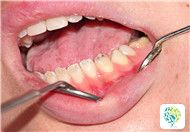Swollen gums can be treated with cephalosporin or amoxicillin, but it is best to consult a dentist at the hospital's oral department. After examining the specific condition of the teeth, targeted treatment can be provided. It is generally recommended that patients pay attention to oral hygiene. If the condition does not improve, they can go to the hospital for intravenous infusion to reduce inflammation. After the inflammation has subsided, an X-ray can be taken to check for normal growth and consider whether to remove the affected area. Generally, if the condition is not particularly severe, it is recommended that patients do not extract the teeth.

1. What causes swollen gums? For women, endocrine disorders, as well as hormonal changes during menstruation and pregnancy, can lead to swollen gums due to changes in the endocrine environment. Simple heatiness can also cause swollen gums. When the weather is dry, the body's saliva secretion decreases, the respiratory tract dries up, and eating spicy or fried foods can easily lead to heatiness and swollen gums.
2. How to treat swollen gums? The solution usually starts with diet. The diet should be light and easy to digest, and snacks should be avoided. To reduce the heatiness that causes swollen gums, in addition to drinking plenty of water, necessary herbal remedies such as honeysuckle granules or chuanxianlian tablets can be taken, which are very effective.

